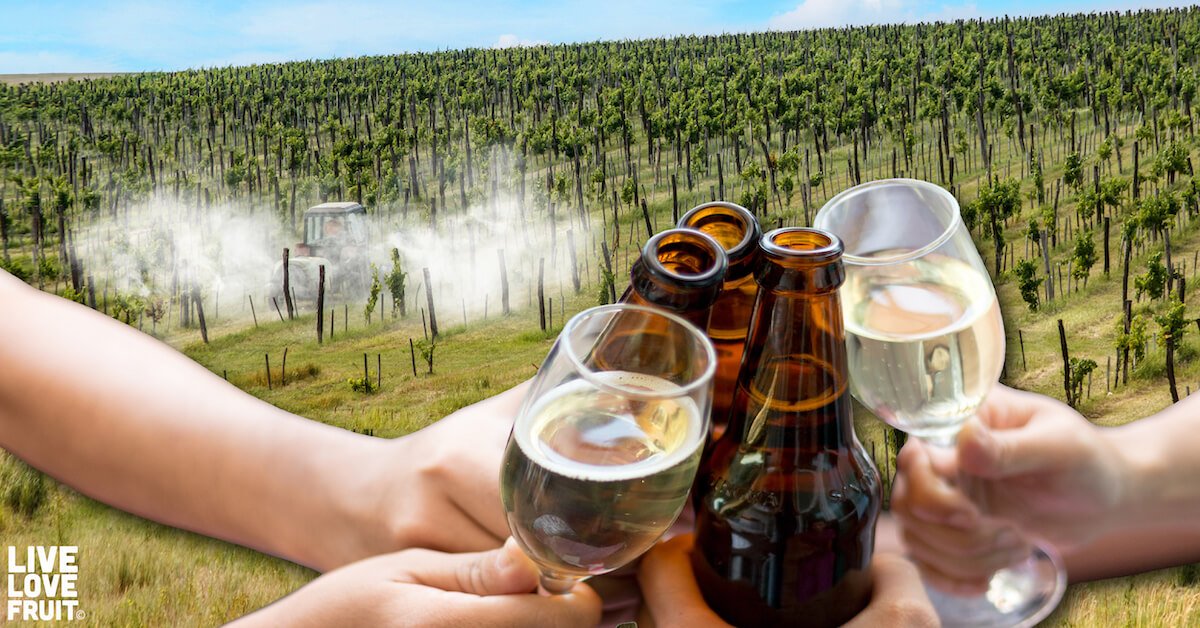Mar 10, 2019 Carly Fraser
Concern over glyphosate in food has become a major topic the last couple years. After the EWG released their report regarding glyphosate in food, many people have become wary of the food products they were purchasing. But it isn’t just cereals and granola bars people have to worry about. According to a new study published in February of 2019, people now need to start being concerned about glyphosate in beer and wine.
The results of the study come on the heels of a study conducted just a few years back. Ten different wine samples were sent to the Microbe Infotech Lab of St. Louis, and they found that both conventional and organic wines were tainted with glyphosate (1). The new study, conducted by the education group, U.S. PIRG, confirms these findings.
Glyphosate-based herbicides like Roundup are some of the most commonly used agricultural chemicals in the world. The concerns surrounding the chemical aren’t far-fetched, and as we continually see organic products coming up as positive for glyphosate, it makes us question – are any foods safe from this dangerous chemical?
Barley, Grape Crops Highly Contaminated
One of the best ways of telling whether your favorite foods have been contaminated with glyphosate is by looking at crop statistics. In fact, glyphosate-based herbicides are widely used in some of the most popular foods consumed today. Wheat, soy, almonds, corn, you name it. The crops also don’t have to be deemed “Roundup ready” in order to be sprayed.
Glyphosate is often used as a pre-harvest herbicide and harvest aid on cereal crops like wheat, oats and vegetable seed oils like canola and sunflower. It is also used as weed control on crops like oranges and grapes.
As an aside here, let’s just keep in mind that the term “weed” is a human construct, derived from our interactions with these plants. While weeds do innately compete with our desired plants for nutrients, water and space, that doesn’t mean they aren’t necessary. Maybe it’s time farmers and all those who garden start working with nature as opposed to against it. It is only then that we’ll see better results for both ourselves, and the environment.
Back to crops sprayed with glyphosate. If you take a look at this chart from the Environmental Protection Agency (EPA), you’ll see that barley crops are sprayed with over 600,000 pounds of glyphosate annually, and grapes are sprayed with over 1,500,000 pounds of glyphosate, annually.
As you might already know, barley is the crop used to make beer, and grapes are the crop used to make wine. With this information in mind, it is of no surprise to me that most wine and beer samples contain glyphosate.
Glyphosate in Beer and Wine
To explore how much Roundup the average person drinks, the U.S. PIRG tested 15 beers and 5 wines for glyphosate, the weedkiller’s active ingredient. Of the 20 samples tested, all but ONE contained glyphosate, and 3 out of 4 organic beers and wines contained glyphosate.
The testing results revealed the following. Glyphosate was measured in parts per billion (ppb). Also, keep in mind that while this list is not complete, it is reasonable to assume that almost all conventional wines contain some level of glyphosate.
Glyphosate in Wines
1. Sutter Home Merlot: 51.4 ppb
2. Beringer Founders Estates Moscato: 42.6 ppb
3. Barefoot Cabernet Sauvignon: 36.3 ppb
4. Inkarri Malbec: Certified Organic: 5.3 ppb
5. Frey Organic Natural White: 4.8 ppb
Glyphosate in Beer
1. Tsingtao Beer: 49.7 ppb
2. Coors Light: 31.1 ppb
3. Miller Lite: 29.8 ppb
4. Budweiser: 27 ppb
5. Corona Extra: 25.1 ppb
6. Heineken: 20.9 ppb
7. Guinness Draught: 20.3 ppb
8. Stella Artois: 18.7 ppb
9. Ace Perry Hard Cider: 14.5 ppb
10. Sierra Nevada Pale Ale: 11.8 ppb
11. New Belgium Fat Tire Amber Ale: 11.2 ppb
12. Sam Adams New England IPA: 11 ppb
13. Stella Artois Cidre: 9.1 ppb
14. Samuel Smith’s Organic Lager: 5.7 ppb
15. Peak Beer Organic IPA: no detected level
The highest level of glyphosate found in PIRG’s samples was 51 ppb. You might be asking – how is this allowed? Doesn’t the government protect our food from dangerous, cancer-causing chemicals? The answer is yes, they do, but the real question is why they’re allowing this chemical in our food at all. Is there really any safe limit for a chemical that is labelled as a Group 2A carcinogen, aka. “probable human carcinogen”?
Is Any Level of Glyphosate Safe?
The U.S. Environmental Protection Agency’s safety limit for glyphosate is 100 times greater than the amounts found in the beer and wine samples. The EPA doesn’t actually have a limit for the levels of glyphosate in beer and wine, but they do allow glyphosate residues on over 150 different food and feed crops at levels of 0.2 to 400 ppm (200 to 400,000 ppb) (2).
While these amounts are much higher than that found in wine and beer, there is the concern of how much wine and beer people are drinking. Since some people drink a large quantity of beer and wine in one sitting, they should be cautious of the levels of glyphosate they may be potentially consuming.
A new study, called The Global Glyphosate Study, set out to determine whether the levels of the toxic chemical set as “safe” by the U.S. EPA are actually safe. What they found was that the amounts set as safe by the EPA are not actually safe. Instead, they’re linked to microbiome imbalances and damage to DNA (known as genotoxicity). The results occurred even when there were small exposures to the pesticide for short periods of time.











